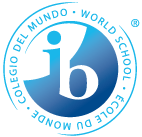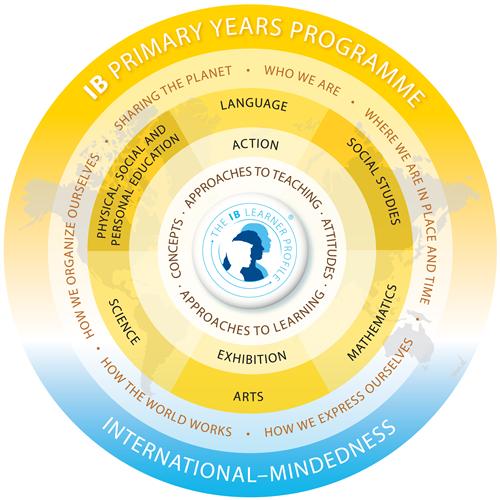-
IB Primary Years Programme

River Oaks Elementary is an International Baccalaureate World School authorized to offer the Primary Years Programme to all students. Authorization was originally granted on March 1, 2005, and the school recently completed a successful Program Evaluation in which the IBO granted ROE authorization for another five years.
The IB Primary Years Program (IB PYP) is designed for students between 3 and 12 years of age and "focuses on the development of the whole child as an inquirer, both in the classroom and in the world outside." (www.ibo.org/pyp) It consists of a balanced program of concepts, knowledge, skills, attitudes and actions that promote the development of an internationally-minded student. Providing the framework for study are six transdisciplinary themes: Who we are, Where we are in place and time, How we express ourselves, How the world works, How we organize ourselves, and Sharing the planet.
The IBPYP PhilosophyWhat is the PYP all about? Click here to learn more.
The Learner ProfileThe attributes of the Learner Profile ~ Inquirer, Knowledgeable, Thinker, Communicator, Principled, Open-minded, Caring, Risk-taker, Balanced, and Reflective ~ are the values essential to the development of an internationally-minded student. They are the common ideals that connect the Primary Years Programme (PYP), the Middle Years Programme (MYP), and the Diploma Programme (DP).
The IB Framework
The program has multiple components:
- Knowledge ~ what do we want students to know about? The program provides a framework in which units of inquiry are created to produce engaging, relevant, challenging, and significant learning that allows students' understanding of the transdisciplinary themes to develop and evolve.
- Concepts ~ what do we want students to understand? Key concepts are expressed as questions that propel the process of inquiry: What is it like? How does it work? Why is it like it is? How is it changing? How is it connected to other things? What are the points of view? What is our responsibility? How do we know?
- Skills ~ what do we want students to be able to do? Sets of cross-curricular skills (thinking, social, communication, self-management, and research) are acquired through the process of inquiry.
- Attitudes ~ what do we want students to feel, value and demonstrate? The program as a whole promotes and fosters the development of personal attitudes towards people, the environment and learning. Appreciation, Commitment, Confidence, Cooperation, Creativity, Curiosity, Empathy, Enthusiasm, Independence, Integrity, Respect and Tolerance
- Action ~ how do we want students to act? Students are encouraged to reflect, to choose wisely, and to act responsibly with their peers and teachers as well as in the wider community.
- Approaches to Teaching and Assessment ~ Teachers instruct in a way that is differentiated, authentic, engaging and meaningful. Teachers pre-assess and re-assess to help students in their understanding.
The Curriculum FrameworkThe PYP offers a comprehensive, inquiry-based approach to teaching and learning. It provides an internationally designed model for the learner to construct meaning and incorporates guidelines on student learning styles, teaching methodologies and assessment strategies. The curriculum framework is an expression and an extension of several inter-related questions:
- What do we want to learn?
- How best will we learn?
- How will we know what we have learned?

The Importance of the POI
IB provides a structured approach to collaborative preparation in the form of unit planners designed to assist teachers in the organization of units of inquiry. All of these planners used throughout a school and across all grade levels are then organized according to their themes and combined into what is referred to as the POI, or Programme of Inquiry, of the school. Click here for ROE's Programme of Inquiry.
Assessment in the IBPYP Program
Teachers and students from the school assess student work using the following types of assessment:
- Formative – This is interwoven with daily learning and helps teachers and students find out what the students already know in order to plan the next stage of learning. Formative assessment and teaching are directly linked; neither can function effectively without the other.
- Summative – This happens at the end of the teaching and learning process. It provides students with opportunities to demonstrate what they have learned.
Select a School...
Select a School
- Alcott Elementary School
- Almeda Elementary
- Alternative Certification Program
- Anderson Elementary School
- Arabic Immersion Magnet School (AIMS)
- Ashford Elementary
- Askew Elementary School
- Atherton Elementary
- Attucks Middle School
- Austin High School
- Baker Montessori
- Barbara Bush Elementary
- Barbara Jordan Career Center
- Barrick (C. E.) Elementary
- Bastian Elementary School
- Baylor College of Medicine Academy at James D Ryan MS
- Baylor College of Medicine Biotech Academy at Rusk
- Bellaire High School
- Bellfort Early Childhood Center
- Benavidez Elementary
- Benbrook Elementary
- Berry Elementary
- Billy Reagan K8 Educational Center
- Frank Black Middle School
- Blackshear Elementary
- Bonham Elementary School
- Bonner Elementary
- Braeburn Elementary
- Briargrove Elementary School
- Briarmeadow Charter
- Briscoe Elementary
- Brookline Elementary
- Browning Elementary
- Bruce Elementary
- Burbank Elementary
- Burbank Middle
- Burrus Elementary
- Cage Elementary
- Career Readiness
- Carnegie Vanguard High School
- Carrillo Elementary
- Challenge Early College High School
- Clemente Martinez Elementary School
- Clifton Middle School
- Codwell Elementary
- Community Services
- Condit Elementary
- Coop Elementary
- Cornelius Elementary
- Crespo Elementary
- Crockett Elementary School
- Cullen Middle School
- Cunningham Elementary
- César E. Chavez High School
- Daily, Ray K. Elementary
- David G. Burnet Elementary
- Davila Elementary
- De Chaumes Elementary
- De Zavala Elementary
- Deady Middle School
- DeAnda Elementary School
- Distrito Escolar Independiente de Houston
- Dogan Elementary School
- Durham Elementary
- Durkee Elementary
- East Early College High School
- Eastwood Academy
- Edison Middle School
- Elementary DAEP
- Eliot Elementary School
- Elmore Elementary School
- Elrod Elementary School
- Emerson Elementary
- Energized for Excellence
- Energy Institute High School
- McGowen Elementary
- Farias ECC
- Cook Elementary
- Field Elementary School
- Fleming Middle School
- Foerster Elementary
- Fondren Elementary
- Fondren Middle School
- Fonville Middle School
- Fonwood Early Childhood Center
- Forest Brook Middle School
- Franklin Elementary
- Frost Elementary
- Furr High School
- Gabriela Mistral CEC
- Gallegos Elementary
- Garcia Elementary School
- Garden Oaks Montessori
- Garden Villas Elementary
- Golfcrest Elementary
- Gregg Elementary
- Gregory-Lincoln Education Center
- Gross Elementary
- Halpin Early Childhood Center
- Hamilton Middle School
- Harper DAEP High School
- Harris (John R.) Elementary
- Harris (Roland P.) Elementary School
- Hartman Middle School
- Hartsfield Elementary School
- Harvard Elementary School
- Health and Medical Services
- Heights High School
- Helms Elementary School
- Herod Elementary School
- Herrera Elementary School
- High School Ahead Academy Middle School
- High School for Law and Justice (HSLJ)
- Highland Heights Elementary
- Hilliard Elementary School
- Hines Caldwell Elementary School
- HISD Benefits
- HISD Human Resources
- HISD Miles Ahead Scholars
- HISD School Choice
- HISD School Website Resources
- Hobby Elementary School
- Hogg Middle School
- Holland Middle School
- Horn Elementary
- Houston Academy for International Studies
- Isaacs Elementary
- J.P. Henderson Elementary
- Long Academy
- Janowski Elementary
- Jefferson Elementary School
- John G. Osborne Elementary
- Jones Futures Academy
- Kashmere Gardens Elementary Fine Arts Magnet
- Kashmere High School
- Kate Bell Elementary
- Smith, K. Elementary
- Kelso Elementary
- Kennedy (John F.) Elementary
- Ketelsen Elementary
- Key Middle School
- Kinder High School for the Performing and Visual Arts
- Kolter Elementary
- Lamar High School
- Lanier Middle School
- Lantrip Elementary
- Las Americas
- Laurenzo Early Childhood Education Center
- James H. Law Elementary
- Lawson Middle School
- Lewis Elementary
- Liberty High School Homepage
- Lockhart Elementary School
- Longfellow Elementary School
- Looscan Elementary
- Love Elementary School
- Lovett Elementary School Fine Arts Magnet
- Lyons Elementary School
- Mabel B. Wesley Elementary School
- MacGregor Elementary School
- Mading Elementary STEM Academy
- Madison (James) High School
- Mandarin Immersion
- Marcellus Elliot Foster Elementary
- Twain (Mark) Elementary
- Mark White Elementary School
- Marshall Middle Academy of Fine Arts
- Martin Luther King, Jr. Early Childhood Center
- McNamara Elementary
- McReynolds Middle School
- Medicaid Finance & Consulting Services
- Memorial Elementary
- Meyerland Performing and Visual Arts Middle School
- DeBakey High School for Health Professions
- Mickey Leland College Preparatory Academy for Young Men
- Gulfton
- Middle College at Felix Fraga
- Milby High School
- Milne Elementary School
- Mitchell Elementary School
- Montgomery Elementary
- Moreno, Joe E. Elementary
- Henderson Elementary School
- Neff Early Learning Center
- Neff Elementary School
- North Forest High School
- North Houston Early College HS
- Northline Elementary
- Northside High School
- Oak Forest Elementary School
- Oates Elementary
- Ortiz Middle School
- Paige Elementary
- Park Place Elementary School
- Parker Elementary
- Henry Middle School
- Patterson Elementary
- Paul Revere Middle School
- Peck Elementary
- Pershing Middle School
- Petersen Elementary
- Pilgrim Academy
- Pin Oak Middle School
- Piney Point Elementary School
- Pleasantville Elementary School
- Poe Elementary
- Port Houston Elementary School
- Project Chrysalis Middle School
- Pugh Elementary
- Raul Martinez Elementary
- Red Elementary
- Redesign
- Reynolds Elementary
- River Oaks Elementary IB World School
- Roberts Elementary
- Robinson Elementary
- Rodriguez, Sylvan Elementary
- Roosevelt Elementary
- Ross (Betsy) Elementary School
- Rucker Elementary
- Sam Houston Math, Science and Technology Center
- Sanchez Elementary
- Scarborough Elementary
- Scarborough High School
- Scroggins Elementary School
- Secondary DAEP
- Seguin Elementary
- Shadowbriar Elementary
- Shadydale Elementary School
- Sharpstown High School
- Sharpstown International School
- Shearn Elementary School
- Sherman Elementary School
- Sinclair Elementary School
- South Early College High School
- Southmayd Elementary School
- Sterling Aviation High School
- Stevens Elementary
- Stevenson Middle School
- Student Supports
- Students
- Sugar Grove Academy Middle School
- Sutton Elementary
- T.H. Rogers School
- Tanglewood Middle School
- Texas Connections Academy at Houston
- Texas Education
- The Rice School La Escuela Rice
- The School at St George Place
- Thomas Middle School
- Thompson Elementary
- Thurgood Marshall Elementary School
- Tijerina Elementary
- Tinsley Elementary
- Travis Elementary School
- Valley West Elementary
- Virgil I. Grissom Elementary School
- Wainwright Elementary
- Walnut Bend Elementary
- Waltrip High School
- Washington High School
- Welch Middle School
- West Briar Middle School
- West University Elementary School
- Westbury High School
- Westside High School
- Wharton Dual Language Academy
- Wheatley High School
- Whidby Elementary
- White (Ed) Elementary
- Whittier Elementary School
- Williams Middle School
- Windsor Village Vanguard Magnet Elementary
- Wisdom High School
- Woodson PK-5 Leadership Academy
- Worthing High School
- Yates High School
- Navarro Middle School
- Young Elementary
- Young Scholars Academy for Excellence
- YWCPA







